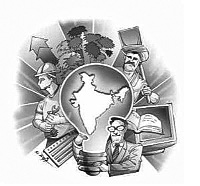Intro: Compared to manufacturing sector the service sector is more promising.
 Prime Minister Narendra Modi has indicated his resolve to make India a global manufacturing hub. We want to invite the world, he said in his address to the nation, to “Make in India,” and we want to establish “Made in India” brand across the globe. The resolve is welcome but question is whether the manufacturing sector is the correct route to attain this objective?
Prime Minister Narendra Modi has indicated his resolve to make India a global manufacturing hub. We want to invite the world, he said in his address to the nation, to “Make in India,” and we want to establish “Made in India” brand across the globe. The resolve is welcome but question is whether the manufacturing sector is the correct route to attain this objective?
Compared to manufacturing sector the service sector is more promising. The share of manufacturing in Indian economy has remained stagnant at 24 percent since beginning of reforms in 1991 to present. This means that the rate of increase of output in the manufacturing sector has been close to the rate of increase in GDP, and hence the share has remained constant. The share of services sector, excluding government services, on the other hand, has increased dramatically from 27 percent to 47 percent in the same period. Services like traffic police and sewage facilities provided by the municipal corporations are part of the services sector but I have excluded these because our purpose is to evaluate the benefits of market-driven manufacturing and services sectors.
As per the Economic survey for 2013-14, in India, the growth of services-sector GDP has been higher than that of overall GDP between the period FY2001- FY2014. Services constitute a major portion of India’s GDP with a 57 per cent share in GDP at factor cost (at current prices) in 2013-14, an increase of 6 percentage points over 2000-01. This trend clearly indicates that the services sector is the sunrise sector, and not manufacturing. This is the trend observed world over. The share of services is up to 90 percent in some high income countries, too.
 As per the Economic survey for 2013-14, in India, the growth of services-sector GDP has been higher than that of overall GDP between the period FY2001- FY2014. ? As per the Economic survey for 2013-14, in India, the growth of services-sector GDP has been higher than that of overall GDP between the period FY2001- FY2014. ? |
The stagnation in share of manufacturing happens because we can consume only limited physical goods, whereas the consumption of services is almost limitless. One can eat only so much bread, put so many air-conditioners in his house; or ride on so many cars as the demand be. But the possibilities in tourism and video games are much greater. Hence it is seen that the consumption of services, not manufacturing, increases with economic development.
The second problem is of the global race to the bottom. China is merrily destroying its environment in order to produce cheap goods for the world market. The Chinese Government does not require industries to set up pollution treatment plants and has allowed its air and water to be polluted. The cost of production in China is less because the industries do not have to set up these plants. On the contrary, in India, the cost of production is more because our industries have to set up these plants. Indian businesses will be able to compete with China only if they too are allowed to produce without installation of treatment plants and allowed to pollute the air and water. The decision is ours!
Also Read This : Save Fossil Fuel, Save Economy ?
A single country (China) is destroying the environment and is exhorting the world to follow a race to the bottom in a global market. Expansion of manufacturing in India will, therefore, necessarily have to follow the anti-environment policies of the rouge countries. This problem will be much less in the services sector. The consumption of physical raw material is less in services sector hence the cost of production of services in China does not decline much even if the country destroys its environment.
Infact, the quality of jobs in this sector is generally better than manufacturing. The number of skilled persons required is more in services sector too. Therefore services sector will provide more numbers of high paid jobs to our countrymen. And this is the reason why we should focus on expansion of services sector.
Prime Minister Modi, moreover, has also welcomed foreign investors to set up manufacturing units in India. Question is why can the job not be accomplished by Indian businessmen? There is no consensus among economists regarding the long run impacts of FDI on host country. According to some studies, FDI is beneficial in the short run but harmful in the long run. Therefore, in the first instance, effort should be to get Indians to “Make in India” and export. And then the FDI should be welcomed where specific proprietary technologies are involved.
I am unable to fathom why the bureaucrats are goading Modi to promote manufacturing instead of services. One possibility is that they are driven by their personal interests. Establishing a manufacturing facility will require many interface with the bureaucrats—the land has to be acquired; coal linkage may be needed; compliance with the factory act will need to be made; no objection certificate from the Pollution Control Board is to be obtained, etc. Each of these steps will provide opportunity for the bureaucrats to take bribes. These opportunities get limited in the provision of services. For example, I write my column and sell it to newspapers. For this I do not have to take permission from any government office—thankfully. Maybe this is why bureaucracy is pushing for the manufacturing sector because they understand there is nothing for them in the services sector.
It therefore becomes necessary for the Government to take a proactive approach to the development of the services sector. I give an example. There is a huge demand for translation services across the world for which India must develop the capability to translate, for example, a text book from German to Chinese. It is necessary to spread the knowledge of foreign languages. And for this, the Government can establish Institutes of Foreign Languages along the lines of IITs, IIMs and AIIMS’ in various states.
India already has emerged as an important destination in health tourism. A medical procedure that costs, say, Rs 50 lacs in the United States can be undertaken here in mere Rs 5 lacs or less. We are unable to materialise this potential because the regulatory structure is woefully inadequate. The health tourist does not have an efficacious and effective remedy in case the doctor does not provide the promised services. The visitor cannot be expected to file a case in the Consumer Court and fight for decades. A Health Tourism Act therefore should be enacted with provision for establishment of a Health Tourist regulatory and enforcement establishment. Similar steps can be taken in relation to other services. For better results, Modi too can take a relook at his focus on the manufacturing sector.
-Dr Bharat Jhunjhunwala ?(The writer was a former Professor of Economics at IIM Bengaluru)?














Comments